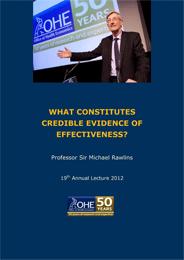Sign up to our newsletter Subscribe
Challenges and Solutions for Budget Impact Analysis of Gene Therapies

In this monograph based his remarks at the 19th OHE Annual Lecture, Professor Sir Michael Rawlins examines the standards of proof required to show the effectiveness of a medical therapy. He traces the historical development of inductive and deductive approaches in science, discussing…
In this monograph based his remarks at the 19th OHE Annual Lecture, Professor Sir Michael Rawlins examines the standards of proof required to show the effectiveness of a medical therapy. He traces the historical development of inductive and deductive approaches in science, discussing the strengths and weaknesses of each.
Sir Michael expresses concern that some view randomised controlled trials (RCTs) as the “gold standard” of evidence. RCTs, he argues, are very important, but other approaches to evidence development can prove equally valid in some circumstances.
The dangers inherent in “hierarchies” of evidence are explored. Sir Michael expresses concern about a formulaic reliance on them as a substitute for careful judgement. As he puts it, “It is judgement, conditioned by the totality of the evidence base, that lies at the heart of decision-making.”
What constitutes credible evidence of effectiveness
Rawlins, M.
(2013) What constitutes credible evidence of effectiveness. OHE Monograph. Available from https://www.ohe.org/publications/what-constitutes-credible-evidence-effectiveness/